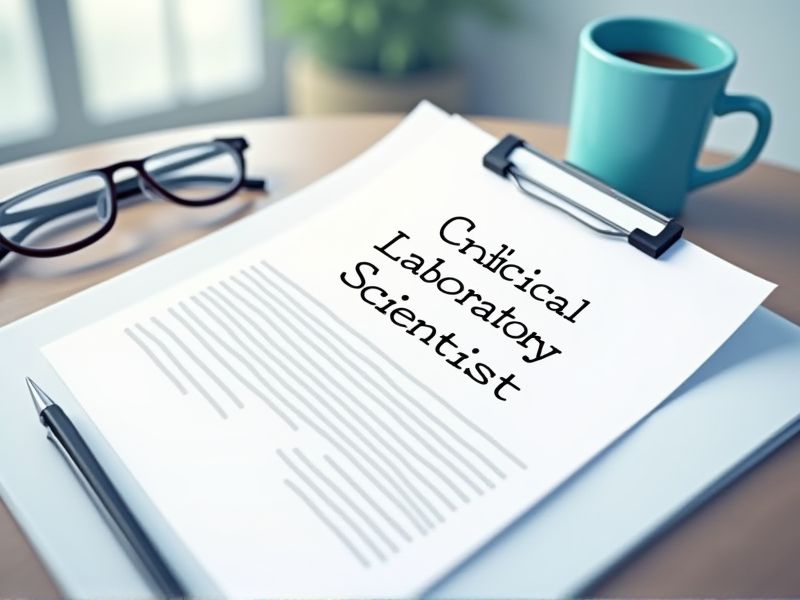
Clinical Laboratory Scientists require specific certifications to ensure the accuracy and reliability of diagnostic testing. These certifications serve as a benchmark for the industry's best practices, ultimately safeguarding patient health. Obtaining certifications verifies a scientist's knowledge of evolving technologies and methodologies in the laboratory setting. Some essential certifications for Clinical Laboratory Scientists include NCA (National Credentialing Agency), ASCP (American Society for Clinical Pathology), and AMT (American Medical Technologists).
ASCP Board of Certification - Medical Laboratory Scientist (MLS(ASCP))
The ASCP Board of Certification for Medical Laboratory Scientist (MLS(ASCP)) establishes a recognized standard of competence, leading to improved patient care through accurate and reliable test results. Certification aligns with regulatory requirements and instills trust in both medical professionals and patients regarding the expertise of lab personnel. Holding an MLS(ASCP) credential enhances career advancement opportunities and potential salary increases within the healthcare industry. This certification ensures continued professional development and knowledge, keeping laboratory scientists updated with the latest advancements in the field.
American Medical Technologists (AMT) Certification in Medical Laboratory Science
Obtaining the American Medical Technologists (AMT) certification in Medical Laboratory Science verifies a professional's competence in critical areas like hematology, microbiology, and clinical chemistry. The certification improves job prospects, as many employers require or prefer candidates with recognized credentials. It enhances credibility and ensures adherence to industry standards, aligning with evolving healthcare regulations. With technological advancements and increasing complexity in laboratory procedures, certified professionals are better equipped to maintain high-quality patient care.
American Association of Bioanalysts (AAB) Certification
The AAB Certification ensures that Clinical Laboratory Scientists meet high standards of competence, which leads to more accurate and reliable diagnostic results. By obtaining this certification, professionals demonstrate their expertise in diverse laboratory techniques and protocols, enhancing their credibility in the field. Employers often prefer or require certified personnel, influencing job opportunities and career advancement within medical laboratories. The certification process includes rigorous assessment, promoting continuous education and alignment with the evolving landscape of medical technology and regulations.
National Credentialing Agency (NCA) Certification for Medical Laboratory Personnel
The National Credentialing Agency (NCA) Certification for Medical Laboratory Personnel establishes a standardized level of competency for Clinical Laboratory Scientists, ensuring they possess the necessary skills to accurately and safely conduct complex tests. Certification by a recognized body like the NCA enhances the credibility of laboratory professionals, which can increase trust among healthcare teams and patients. Hospitals and laboratories often prefer or require hiring certified individuals to comply with accreditation standards, thus encouraging consistency in healthcare delivery. Professional certification can lead to improved career opportunities and higher earning potential for Clinical Laboratory Scientists.
ASCP Certification in Molecular Biology (MLS(ASCP)-MB)
ASCP Certification in Molecular Biology (MLS(ASCP)-MB) is needed for Clinical Laboratory Scientists to validate their expertise in molecular diagnostics, an essential area in modern medical testing. This certification ensures professionals meet rigorous standards, enhancing accuracy and reliability in lab results. Employers and healthcare institutions often require or prefer certified individuals, providing a competitive edge in the job market. The certification process also promotes continuous education, keeping professionals updated with advancements in molecular biology techniques.
ASCP Blood Banking/Transfusion Medicine Specialist (BCT)
Increased demand for safe blood transfusions has heightened the need for specialists like ASCP Blood Banking/Transfusion Medicine Specialist (BCT) to ensure compatibility and safety. BCT specialists possess advanced skills in blood typing, testing for transfusion-transmissible infections, and managing blood component inventory, which reduces the risk of transfusion reactions. Their expertise is critical in complex cases, such as patients with rare blood types or multiple antibodies, ensuring precise and effective clinical decisions. Regulatory guidelines require meticulous documentation and quality assurance practices, areas where BCT specialists provide essential oversight and compliance.
Certified Blood Bank Specialist (CBBS)
Certified Blood Bank Specialists (CBBS) enhance the safety and accuracy of blood transfusions, a critical component in clinical laboratory settings. Their specialized knowledge ensures that blood products are correctly matched and tested, reducing the risk of transfusion reactions. Clinical laboratory scientists rely on CBBS expertise to maintain compliance with regulatory standards and improve patient outcomes. The presence of a CBBS can also enhance the laboratory's operational efficiency by streamlining blood bank protocols.
Certified Histotechnician (HTCN)
Certified Histotechnicians play a crucial role in the clinical laboratory setting because they excel in preparing tissue samples, ensuring accurate analysis. Their expertise in staining and embedding techniques enhances diagnostic efficiency for Clinical Laboratory Scientists. The precision in tissue preparation directly affects the reliability of pathology results, which assists in effective patient care. Having a Certified Histotechnician streamlines laboratory operations, as their specialized skills complement the broader diagnostic efforts of Clinical Laboratory Scientists.
Certified Cytotechnologist (CT)
The expertise of a Certified Cytotechnologist (CT) in identifying cellular abnormalities aids Clinical Laboratory Scientists in accurately diagnosing diseases like cancer, thereby enhancing patient care. Their proficiency in microscopic examination ensures that laboratory results are both reliable and timely, thus supporting effective medical interventions. The collaborative work between CTs and Clinical Laboratory Scientists allows for a more comprehensive understanding of complex cases, directly impacting clinical decisions. This partnership decreases the likelihood of diagnostic errors, improving overall healthcare outcomes and patient safety.
Clinical Laboratory Improvement Amendments (CLIA) Certification
Clinical Laboratory Improvement Amendments (CLIA) certification ensures the accuracy and reliability of laboratory testing by setting quality standards for all lab environments. This certification is crucial for Clinical Laboratory Scientists because it upholds competence and safety, minimizing diagnostic errors. The pursuit of CLIA certification fosters trust in patient care, as it guarantees adherence to standardized guidelines. Without it, the credibility and quality assurance of lab results could be compromised, risking patient outcomes and broader public health.
Summary
You will notice a significant enhancement in your professional credibility when you earn certifications as a Clinical Laboratory Scientist. This credibility often leads to more job opportunities and potentially higher salaries in clinical laboratory settings. Patients may experience improved care as certified scientists bring advanced skills and knowledge to the diagnostic process. Your laboratory is likely to achieve higher standards of accuracy and reliability, fostering trust and better outcomes.
